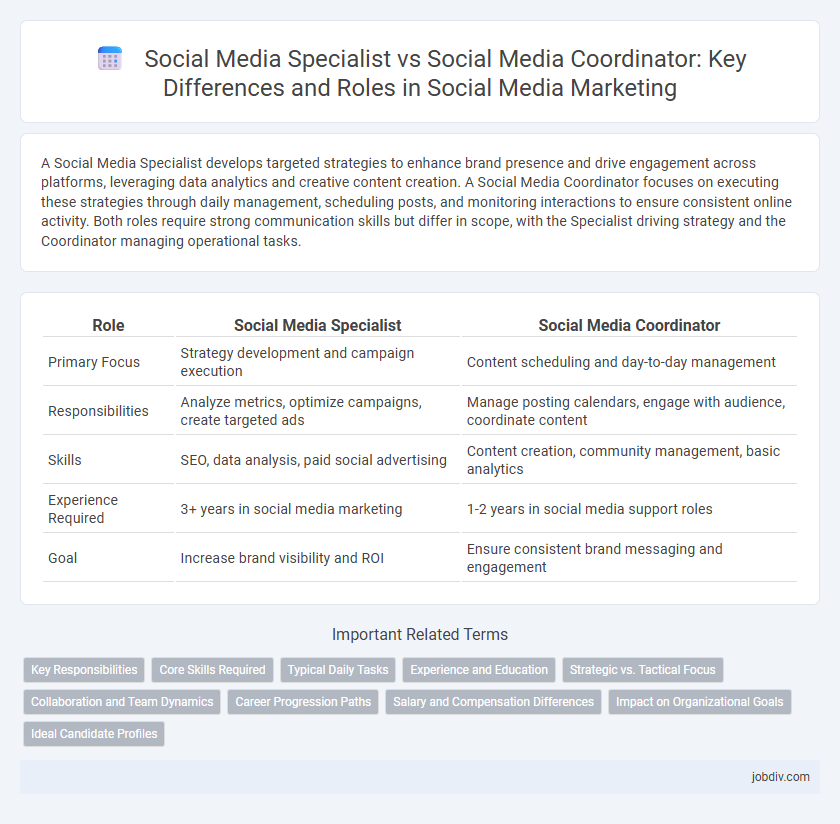A Social Media Specialist develops targeted strategies to enhance brand presence and drive engagement across platforms, leveraging data analytics and creative content creation. A Social Media Coordinator focuses on executing these strategies through daily management, scheduling posts, and monitoring interactions to ensure consistent online activity. Both roles require strong communication skills but differ in scope, with the Specialist driving strategy and the Coordinator managing operational tasks.
Table of Comparison
| Role | Social Media Specialist | Social Media Coordinator |
|---|---|---|
| Primary Focus | Strategy development and campaign execution | Content scheduling and day-to-day management |
| Responsibilities | Analyze metrics, optimize campaigns, create targeted ads | Manage posting calendars, engage with audience, coordinate content |
| Skills | SEO, data analysis, paid social advertising | Content creation, community management, basic analytics |
| Experience Required | 3+ years in social media marketing | 1-2 years in social media support roles |
| Goal | Increase brand visibility and ROI | Ensure consistent brand messaging and engagement |
Key Responsibilities
A Social Media Specialist develops and executes strategic campaigns, analyzes audience data, and optimizes content performance to enhance brand presence. In contrast, a Social Media Coordinator manages daily content scheduling, monitors engagement, and supports campaign logistics to ensure consistent communication. Both roles require collaboration but differ in scope, with Specialists focusing on strategy and Coordinators on operational support.
Core Skills Required
Social Media Specialists excel in content creation, analytics, and strategic campaign management, requiring expertise in SEO, data-driven insights, and advanced digital marketing tools. Social Media Coordinators focus on scheduling posts, community engagement, and basic content development, emphasizing organizational skills and familiarity with social platforms' operational features. Both roles demand strong communication abilities and knowledge of social media trends, but Specialists require a deeper analytical and strategic skill set.
Typical Daily Tasks
Social Media Specialists focus on creating and curating content, analyzing engagement metrics, and optimizing campaigns to improve brand visibility on platforms such as Instagram, Facebook, and Twitter. Social Media Coordinators typically manage scheduling posts, monitoring social media channels for customer interactions, and supporting the implementation of content strategies. Both roles require proficiency in social media management tools like Hootsuite or Buffer and an understanding of audience engagement trends.
Experience and Education
A Social Media Specialist typically requires 3-5 years of hands-on experience managing campaigns, analyzing metrics, and developing content strategies, often holding a bachelor's degree in marketing, communications, or a related field. In contrast, a Social Media Coordinator usually has 1-2 years of experience focused on scheduling posts, engaging with audiences, and supporting campaign execution, with education often limited to an associate or bachelor's degree. Specialists emphasize strategic insights and analytics proficiency, whereas coordinators concentrate on operational tasks and content management.
Strategic vs. Tactical Focus
A Social Media Specialist primarily drives strategic initiatives, analyzing audience insights and market trends to develop long-term content plans that align with brand goals. In contrast, a Social Media Coordinator focuses on tactical execution, managing daily posts, monitoring engagement, and ensuring timely responses across platforms. The Specialist's role emphasizes campaign optimization and data-driven decision-making, while the Coordinator ensures consistent, on-the-ground social media presence.
Collaboration and Team Dynamics
A Social Media Specialist typically leads strategy development and content optimization, driving collaboration by aligning cross-functional teams around targeted goals. In contrast, a Social Media Coordinator manages scheduling and communication flow, ensuring seamless execution and real-time updates within the team. Both roles enhance team dynamics by fostering clear responsibilities and promoting agile workflows in social media campaigns.
Career Progression Paths
A Social Media Coordinator typically manages daily content scheduling and engagement tasks, serving as an entry-level role that builds foundational skills. Progressing to a Social Media Specialist involves strategic planning, campaign development, and data analysis responsibilities that require deeper expertise in social media platforms. Career advancement often moves from Coordinator to Specialist, with potential growth into Social Media Manager or Digital Marketing Director positions.
Salary and Compensation Differences
Social Media Specialists typically earn higher salaries than Social Media Coordinators, with average annual salaries ranging from $50,000 to $70,000 compared to Coordinators who earn between $40,000 and $55,000. Compensation packages for Social Media Specialists often include performance bonuses and advanced benefits due to their strategic roles and specialized expertise. Salary variations also depend on industry, geographic location, and company size, with Specialists benefiting from greater negotiation leverage linked to their higher-level responsibilities.
Impact on Organizational Goals
A Social Media Specialist drives targeted campaigns and analyzes engagement metrics to optimize content strategies, directly enhancing brand visibility and customer acquisition. In contrast, a Social Media Coordinator manages daily postings and community interactions, ensuring consistent brand messaging and timely response, which supports overall audience retention. Both roles collectively contribute to achieving organizational goals by balancing strategic focus with operational execution.
Ideal Candidate Profiles
A Social Media Specialist typically requires advanced skills in content creation, analytics, and strategic campaign management, ideal for candidates with 3-5 years of experience driving brand engagement and growth. In contrast, a Social Media Coordinator suits entry-level professionals skilled in scheduling, basic content development, and community management, often supporting the broader social media strategy. Both roles prioritize strong communication skills, familiarity with social media platforms, and the ability to analyze audience insights to optimize performance.
Social Media Specialist vs Social Media Coordinator Infographic

 jobdiv.com
jobdiv.com